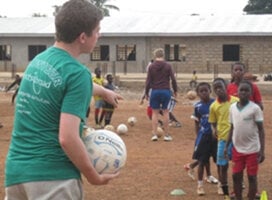High School Volunteer Abroad in Ghana
Ghana is one of the top high school volunteer destinations, and with good reason! Between a reputation for being welcoming and friendly to visitors and volunteers, a rich and vibrant culture mixing modern with the traditional, and a variety of growing public service sectors to provide a wealth of volunteer opportunities, Ghana is an incredible, life-changing place to volunteer. Ghana is an especially attractive location if you’re a high school volunteer -- it’s much more exotic than summer camp, but doesn’t feel like too much of a stretch outside of your comfort zone since you don’t need to know another language, and since Ghana has a reputation for being a safe and stable country. Your family can rest easy that you are well, while you can explore a completely different country and culture, and make an impact with a variety of service project options.
Photo Credits: chadskeers.
Most high school volunteer programs in Ghana combine a balanced schedule of awesome cultural immersion activities -- like traditional drumming & dancing or batik fabric dying -- with meaningful volunteer service so that you can learn about Ghanaian culture while giving back. You’ll most likely volunteer about 4-6 hours per day, with weekends off for special side trips. Read on for some of the ways you can make a difference volunteering in Ghana!
- Education: While English is the official language of Ghana, most kids (especially in rural areas) don’t speak it at home and don’t start learning it until 2nd or 3rd grade. As a native speaker, you can help kids practice English, and also share new perspectives and fun and creative ways of teaching and learning. Since many schools have large class sizes (sometimes as many as 50 students in on classroom!), no matter what you teach or how you teach it, you’ll help teachers support students, boost school attendance and increase the importance of education in the local community.
- Health: As a health volunteer, you can participate in projects ranging from shadowing doctors and nurses at a hospital, assisting with bandages and immunizations at a clinic, engaging in a public health campaign about HIV/AIDS, or educating children and adults on the role of hygiene in disease transmission. Rural areas in particular experience a shortage of healthcare providers, so doctors and nurses are spread thin, providing opportunities for volunteers to help with basic tasks, as well as visiting patients to give comfort.
- Sports: Ghana takes its football (that’s “soccer,” in the US) seriously, and you can help coach a youth soccer team. You can not only help train children to play Ghana’s national past time, but you’ll also help build their self-esteem and confidence, stay healthy, and stay out of trouble.
- Construction and Agriculture: Many programs incorporate a physical project alongside people-to-people volunteering like the options above. You could plant a garden to provide a sustainable food source for a school, paint a mural on a newly-constructed and unfinished school room to inspire children’s creativity, or help construct a playground, water pump, or home. It’s hard work (especially under the hot Ghanaian sun!), but when you look back at a garden, playground, or classroom that wasn’t there two weeks ago, you’ll have a very tangible reminder of the impact of your time volunteering in Ghana!
- Childcare: You can provide love, care, and attention to vulnerable children in day cares, orphanages, and community centers. Playing games, making crafts, and tutoring kids not only helps build their self-esteem, but also allows their primary caregivers the time to meet the kids’ basic needs by cooking and cleaning.
When and Where to Volunteer
High school volunteer programs in Ghana are almost exclusively in the summer, when you’re most likely to have the free time to commit to a 2-4 week program. You’ll be hard-pressed to find a program less than 2 weeks, since quite a bit of cultural adjustment time is factored into most programs’ schedules. Most programs take place in more rural areas, like the western coast near the historic city of Cape Coast, or east into the lush Volta Region. These smaller cities, towns, and villages -- where highways are replaced by dirt roads and malls disappear in favor of roadside stands and vendors selling from baskets on their heads -- are the perfect places for cultural immersion where you can quickly become involved in the community, see a completely different way of life, and leave a lasting impact.
Resources for Parents
Your family wouldn’t be doing their job if they didn’t ask a million questions before sending you off to volunteer in Ghana, so make sure you pass these FAQs along to them:
- Housing & Supervision: High school volunteer accommodations in Ghana vary from private, dorm-style housing provided by the program, to homestays with carefully selected local families. Supervision likewise varies between program staff travelling with participants from the US to Ghana, and local Ghanaian staff members who stay with students during orientation, volunteer work, cultural activities, and field trips, with a roughly 5:1 student to staff ratio.
- Safety:Encourage your family to check out the U.S. State Department’s Ghana travel page, which is full of information about Ghanaian culture, history, and safety tips. The biggest concern is typically theft, which is an issue anywhere you go, including in the USA, and can be avoided by leaving expensive jewelry and electronics at home, sticking with program chaperones, travelling in groups, and staying in well-lit areas. Ghana has a stable government, excellent relations with the U.S. and international community, and a reputation for being one of the safest and friendliest countries to travel to in West Africa.
- Health: You will also definitely want to check out the CDC’s health recommendations for travel to Ghana for a list of vaccines that are required (Yellow Fever) and recommended (Hepatitis A & B and Typhoid, among others), as well as general health tips like avoiding raw foods and tap water. Over-the-counter medicines might help you adjust to the cuisine and hot climate, and talk to your doctor about taking anti-malarial medication.
- Communication: Phone and internet service can be a bit inconsistent in Ghana, especially the more rural areas where most high school programs are located. While wifi isn’t common in homes, most communities have internet cafes where you can go to email with friends and family back home, and landline phones are common in homes and program sites. You can also check with your cell phone provider to see if you’ll have service in Ghana. In general, since phone and internet service (and electricity!) can go down with some regularity in Ghana, make sure your family knows not to panic if they don’t hear from you right away, and remember that no news is good news!
Financial Costs
The average cost of a 3-week high school volunteer program in Ghana is about $3500, with programs running anywhere from $2500 to $5000 depending on accommodations (home stays tend to be cheaper, while private home bases cost more to maintain) and how long you stay. On top of program costs, flights to Ghana typically run from $1,500 - $3,000 round trip depending on when you travel, when you buy the tickets, and where you’re travelling from. Don’t forget to budget for your visa (consular fees, photos, and postage add up to about $100), vaccinations, and passport, if you don’t have it yet. Once you’re actually on your program, the daily costs will be minimal, and things like snacks, souvenirs, phone cards to call your family and visits to the internet cafe will typically add up to be well under $100 per week.
Many high school students fundraise for their programs abroad or apply for scholarships. Ask your school guidance counselor if they know of any local or national scholarships or grants available for international volunteer work, and check out these high school travel grants that you may be eligible for, or consider creative fundraising ideas, like hosting a night of culture where you serve Ghanaian food and play Ghanaian music.






